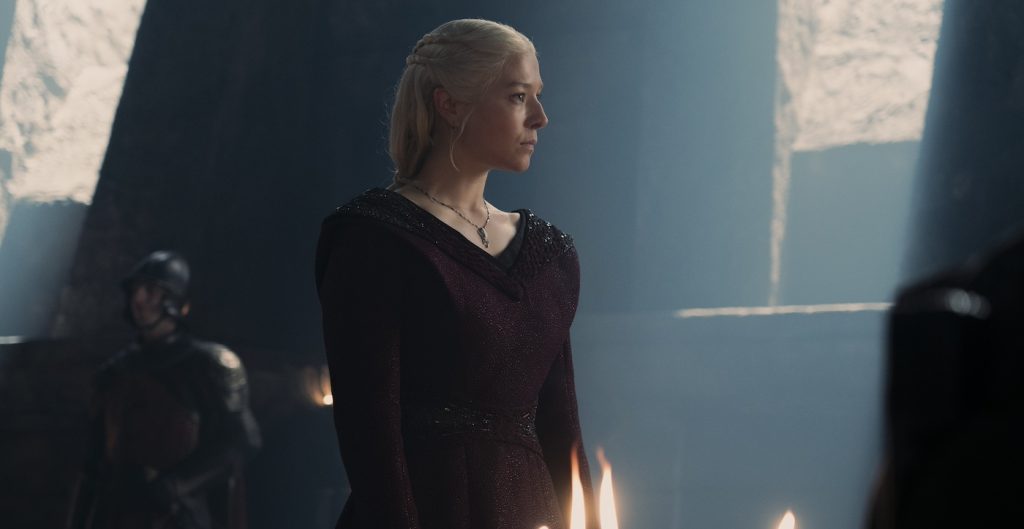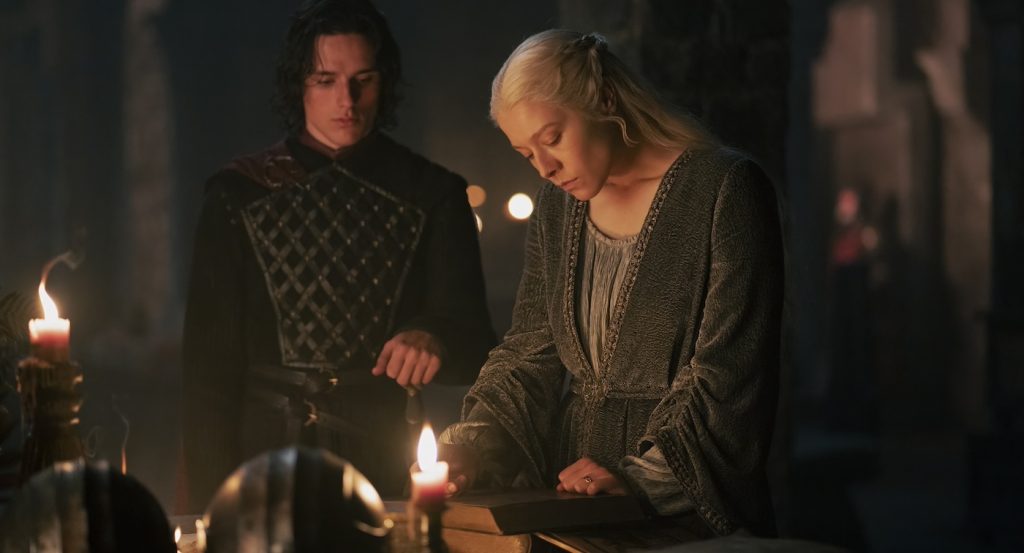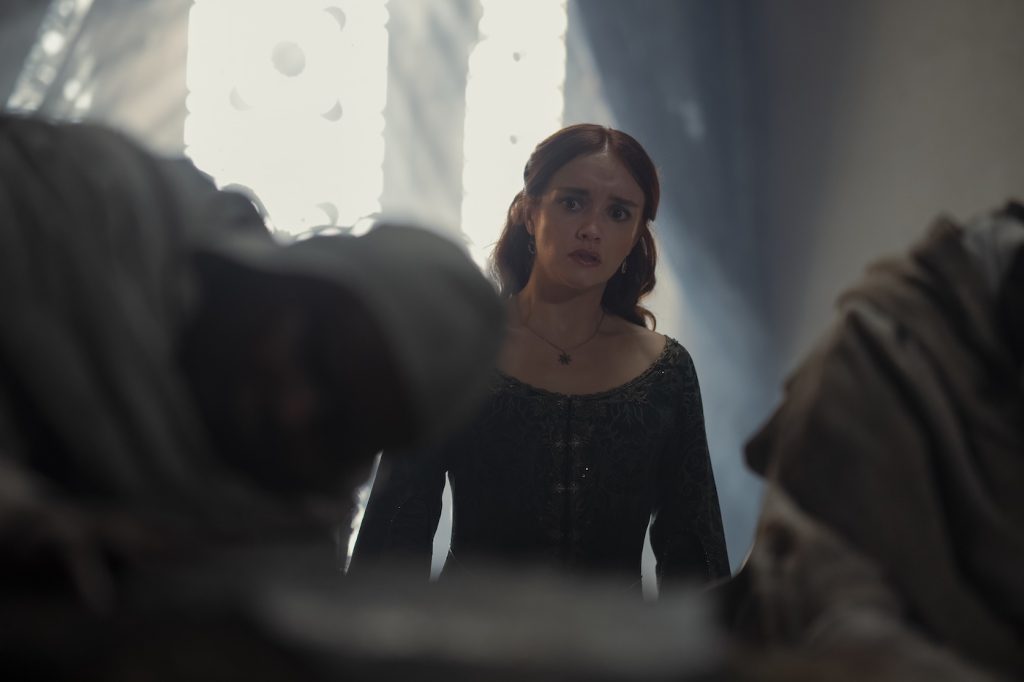“House of the Dragon” Showrunner Ryan Condal on the the Women Vying for Power in Westeros
For those who haven’t watched House of the Dragon since its debut in 2022, the show is based on George R.R. Martin’s book Fire and Blood. The story chronicles the early days of the Targaryen dynasty in the time of Aegon the Conqueror, a forefather to the much-beloved Game of Thrones heroine Daenerys. The new series has developed its own enthusiastic fandom, one that was thrilled to see the premiere of new weekly episodes as of June 16th of this year.
Season two is bigger, bloodier, and more bombastic as it explores the Dance of the Dragons, a civil war that promises to leave a wide swath of both dead dragons and humans in its wake. Following the departure of the show’s co-creator, Miguel Sapochnik, the reins are now held by sole showrunner Ryan Condal. Condal is known for his encyclopedic knowledge and love of Martin’s world of epic battles, Shakespearean and incestuous families, and deadly dragons.
The Credits spoke to Condal about the powerful women of House of the Dragon in front of and behind the camera. Be advised that spoilers are ahead for those who haven’t watched through the fifth episode of this season.
House of the Dragon interrogates misogyny and patriarchy through several main characters, especially regarding power given and denied. You made the decision early on to have powerful women represented in front of and behind the camera. Can you talk a bit about how that is specifically at play as we move closer to the end of Season 2?
Strong women existing in a heavily patriarchal, monarchical society is, I think, one of the key things that sets House of the Dragon apart from Game of Thrones. Not that there weren’t strong women in Game of Thrones, but it was not about a war that was kicked off to deny a woman absolute power in the form of being the sovereign, the person that actually wears the crown and sits on the throne, and this war is very much about that. You could debate who deserves to sit on the throne more and who would become a better sovereign, but none of that matters in a medieval society. It was always about primogeniture and who was meant to sit on the throne by the gods or God. In this case, there’s a split decision in the sense that half the realm believes it should have been who Viserys decreed, and half believes that it should be as it always was, which was that a male sits on the throne. So one of the many things we wanted to do in this series is interrogate what it is like to live as powerful women, specifically through the eyes of two of the very most powerful women in this story, against this overwhelming tradition and societal structure of keeping men in power and keeping women in their place. That’s not to say that women don’t have power. You can have a certain amount of power, but you can’t have THE power.

You certainly expand on that in season two.
Season two continues to explore the fallout of what happens in season one because now we’re witnessing a war being fought over this disagreement. It’s gonna be very bloody, and it’s a nuclear conflict because we have dragons on either side of it, which is also unique when you hold it up to the original series. On one side, you have a woman who is the Commander in Chief in Rhaenyra [Emma D’Arcy], who is prosecuting her side of the war. As you’ve seen, it has been difficult for her to get her point across and be a good democratic sovereign the way she learned to be from Viserys [Paddy Considine], studying as his cupbearer. Viserys always listened to the counselors around him. You see how much Rhaenyra struggles with that, and part of her arc this season as it continues to unfold is how she starts to really run against that particular grain as that methodology continues to fail for her.

We are seeing her trying to be a good queen.
Yes. That’s definitely a theme that Viserys struggled with, and we’ll see Rhaenyra and the Greens, Aegon, and his side struggle with it. Can you be a great king or queen, a great sovereign and leader, and be a good person at the same time? One of the things this hyper-patriarchal and feudal society teaches us is this world wants and demands of these people that they become ruthless autocrats because that’s the only really effective way to win, stay alive, and stay in power. That’s a theme of the series that goes for both the men and the women, but we always really liked the idea of dramatizing it through the eyes of a woman and seeing what those societal pressures would do to a woman like Rhaenyra, who is intelligent, independent, powerful, but also very flawed.
Clare Kilner directed Episodes 2 and 5 this season. What were some of her creative choices that point to her aesthetic? Do you have a specific example from Episode 5?
Clare’s fantastic. Women directed half of our episodes this season, which we’re very proud of. Four of the eight were directed by female hands. With five total, Clare has directed more episodes of this show than anybody else and will be directing more. For example, this really fantastic shot wasn’t expressly in the script in that great scene at the council table after we realize that Aegon is fighting for his life and indisposed after the battle of Rook’s Rest. There’s a need to put a regent in place to at least carry forward power and rule in Aegon’s absence and possibly to take over if he either passes away or cannot return to the throne or council table. Alcient [Olivia Cooke]’s saying, “It should be me, and let Aemond be the sword and dragon rider in the field.” The idea of that scene was always to watch as Alicent presents herself, and then one by one, the men around the table betray her, ending with Larys and then finally with Criston Cole. They all push their chips over to the side with Aemond. Larys says this devastating thing, “After we started this war over not wanting Rhaenyra to sit on the throne, what would it say now if we raised up a woman of our own?” It’s a very cold and calculating line, and then Criston Cole turns against Alicent himself. It’s Cole’s betrayal of her that is ultimately what the scene is really about. It’s about this sudden and massive transfer of power, as Aemond goes from being the rider of the biggest dragon in the world and possibly having mortally injured his brother to getting to sit in the biggest, most important seat in the realm. Our idea going into the scene and the way we toned it was always that once it’s decided that it’s Aemond, he simply gets up from his seat at the foot of the table, walks around, grabs the king’s ball, sits in the king’s chair and puts the ball in place, then immediately begins making edicts. We wanted to watch this sudden and almost banal transfer of power happen through Aemond.
And how did Clare shift that scene?
She did this really interesting thing when she was shooting it. From the moment Cole says it must be Aemond, Alicent goes into this fugue state. She sits back in her chair and realizes, “All of this stuff that I’ve done to put my son on the throne, all the moral compromises I’ve made, the way I gave up my body and everything along the years to see my line rise, this is where it’s led me, to be thrown out the back door as soon as I’m inconvenient to anybody.” Clare just did this great shot that’s just a very slow push in on Alicent, so from the moment that Aemond sits down and starts making his proclamations as essentially the new king, you cut away from all of that. There’s this whole conversation that happens around Alicent and you hear it happening around her, but the camera is just pushing it on her. And this wonderful performance that Olivia Cooke gives, which is very subtle, where you just see her breaking inside, that was the thing that Clare brought. She shot that shot. She brought it to the scene. We loved it, and decided to cut the the rest of the scene around it. So it goes from being a scene about this massive transfer of power to Aemond, and yes, that happens, but then the second half of the scene is this great character moment for Alicent, as you see her just completely stripped of every other remaining reason that she would have had to continue as she was, trying to hold this very fractured Green side of the kingdom together.

New episodes of House of the Dragon air Sundays on MAX.
Featured image: Olivia Cook, Emma D’Aarcy in “House of the Dragon.” Courtesy HBO



